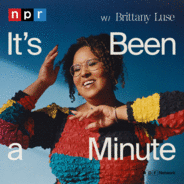
Kultur & Gesellschaft
It's Been a Minute Folgen
Want in on a secret? Your likes and dislikes didn't develop by accident. There are subtle and not-so-subtle forces around you, shaping what you think, how you act, and even who you think you are. Brittany Luse is here to break the spell and help you feel wiser in a society that makes things blurry.THE BEST POP CULTURE PODCAST AWARD WINNER AT THE 2025 SIGNAL AWARDSIt’s Been A Minute with Brittany Luse is the best podcast for understanding what’s going on in culture right now, and helps you consume it smarter. From how politics influences pop culture to how identity influences tech or health, Brittany makes the picture clearer for you every Monday, Wednesday, and Friday.It’s Been A Minute reaches millions of people every week. Join the community and conversation today.If you can't get enough, try It's Been a Minute Plus. Your subscription supports the show and unlocks a sponsor-free feed. Learn more at plus.npr.org/itsbeenaminute
Folgen von It's Been a Minute
-
Folge vom 20.09.2024Is Diddy hip-hop's Weinstein? Plus, Brittany gets rejectedOn Monday, the embattled rap mogul Sean 'Diddy' Combs was arrested and charged with sex trafficking and racketeering. He's been denied bail twice, and is facing a sentence of 15 years to life in prison. Host Brittany Luse is joined by NPR Music editor Sidney Madden and legal affairs reporter Meghann Cuniff to understand what this indictment means for Combs and if this could be the beginning of a #MeToo movement in hip-hop.Then, Brittany is joined by Tony Tulathimutte, author of Rejection, to talk about a rising culture around rejection, his book and why online life can enable rejections to curdle inside us.Learn more about sponsor message choices: podcastchoices.com/adchoicesNPR Privacy Policy
-
Folge vom 17.09.2024The SMACKDOWN: Brunch vs. Twerking vs. Louis ArmstrongWho will win today's cage match?Welcome to The Smackdown! For the next several weeks Brittany is hosting debates in cities and regions across the United States to find out who and what are the most influential things from those places. This episode Brittany lands in New Orleans, Louisiana, and debates with Gulf States Newsroom health equity reporter Drew Hawkins and writer & editor Ko Bragg. There will be winners. There will be losers. There will be surprises.Learn more about sponsor message choices: podcastchoices.com/adchoicesNPR Privacy Policy
-
Folge vom 13.09.2024Trump goes podcasting and Harris turns a lookPodcast and social media influencers have become important campaign stops for political hopefuls. But what kind of voters are the candidates courting? And what does the popularity of these interviews say about the growing political power of the influencer? Brittany is joined by Slate staff writer Luke Winkie and NBC News tech and culture reporter Kat Tenbarge to find out. But first, what can we learn about the political candidates through their clothes? After the presidential debate, Brittany sat down with Washington Post fashion writer Rachel Tashjian and New York Times chief fashion critic Vanessa Friedman to talk about the fashion choices of the front runners and how power dressing has changed. They also play a Taylor Swift trivia game.Learn more about sponsor message choices: podcastchoices.com/adchoicesNPR Privacy Policy
-
Folge vom 10.09.2024The SMACKDOWN: Gucci Mane vs. Angela Davis vs. Sun RaWho will win today's cage match?Welcome to The Smackdown! For the next several weeks Brittany is hosting debates in cities and regions across the United States to find out who and what are the most influential things from those places. This episode Brittany lands in Birmingham, Alabama, and debates with Gulf States Newsroom sports & culture reporter Joseph King and AL.com culture reporter Cody Short. There will be winners. There will be losers. There will be surprises.Learn more about sponsor message choices: podcastchoices.com/adchoicesNPR Privacy Policy
